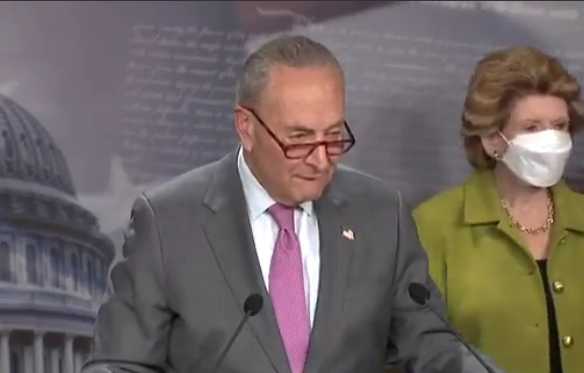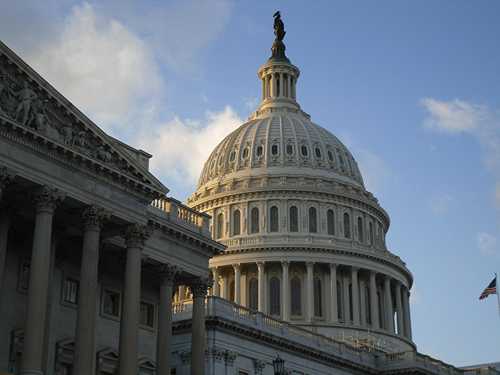An updated list of violations by members of Congress arrives as an outright ban remains stuck in both chambers.
A running tally updated Tuesday shows that more than 60 members of Congress have recently violated a federal law aimed at preventing insider trading, a finding that comes as proposals to bar federal lawmakers from trading stocks languish in the House and Senate.
“As Congress stalls on a congressional stock trading bill, its members keep breaking the ridiculously weak existing rules.”
According to Insider‘s “Conflicted Congress” project, 63 sitting members of Congress—31 Democrats and 32 Republicans—have “failed to properly report their financial trades as mandated by the Stop Trading on Congressional Knowledge Act of 2012, also known as the STOCK Act.”
The list includes prominent lawmakers such as Sen. Rand Paul (R-Ky.), Sen. Dianne Feinstein (D-Calif.), Rep. Debbie Wasserman Schultz (D-Fla.), and Rep. Madison Cawthorn (R-N.C.), who lost his primary race last week.
Riddled with loopholes and largely toothless, the STOCK Act requires lawmakers to disclose stock transactions and other securities trades worth more than $1,000 within 45 days, a rule aimed at shining light on members of Congress attempting to profit off nonpublic information.
“While lawmakers who violate the STOCK Act face a fine, the penalty is usually small—$200 is the standard amount—or waived by House or Senate ethics officials,” Insider notes.
The lawmaker tally was updated after the investigative outlet Sludge identified three more senators who have recently run afoul of the STOCK Act’s timely reporting mandate: Sen. John Hickenlooper (D-Colo.), Sen. Gary Peters (D-Mich.), and Rep. Jerry Moran (R-Kan.).
“As Congress stalls on a congressional stock trading bill, its members keep breaking the ridiculously weak existing rules,” tweeted Walter Shaub, senior ethics fellow at the Project on Government Oversight and former head of the Office of Government Ethics.
Sludge‘s David Moore and Donald Shaw reported on May 25 that “the deadline for members of Congress to file their annual financial disclosures for 2021 was last week, May 16.”
“But as usual, most members availed themselves of a 90-day extension that will give them until sometime in August to release their reports,” Moore and Shaw noted. “The disclosures list their households assets, as well as other information like outside positions and travel reimbursements, and are often dumped online as hundreds of pages of illegible paper scans.”
Sludge reported that Hickenlooper “was an active stock trader in 2021, his first year in the Senate, filing seven [periodic transaction reports] for transactions including a six-day sell-off of technology company stocks in late October and early November.”
That tech sell-off, according to the reporting, included Hickenlooper “fully unloading” his holdings in Amazon, Alphabet, Apple, Facebook, and other firms, with a total max value of more than $4 million.
There has been progress towards a ban on Congressional stock trading—and now is the time to keep the pressure on, so that we don’t keep seeing violations like these. https://t.co/5gAZh9MDry
— Citizens for Ethics (@CREWcrew) May 30, 2022
A longstanding issue on Capitol Hill, insider trading gained renewed attention at the start of the coronavirus pandemic as a number of lawmakers were accused of attempting to cash in on the public health emergency using privileged information—such as warnings gleaned from secret meetings with public health officials.
One recent analysis of financial disclosures estimated that members of Congress traded $355 million worth of stock in 2021.
Earlier this year, amid an upsurge of anger over congressional stock trading, Democrats in the House and Senate introduced or re-upped legislation that would impose an outright ban on stock trading by lawmakers and their close family members.
Despite gaining support from House Speaker Nancy Pelosi (D-Calif.)—whose husband is a prolific trader—and Senate Majority Leader Chuck Schumer (D-N.Y.), neither chamber has advanced a proposed ban.
Common Dream’s work is licensed under a Creative Commons Attribution-Share Alike 3.0 License. Feel free to republish and share widely.
[content id=”79272″]





